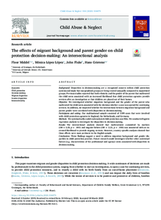Abstract
Background
Disparities in decision-making are a recognized concern within child protection systems and imply that marginalized groups are being treated unequally compared to majoritized groups. Previous studies reported that both ethnicity and the gender of the parent that maltreated the child seem associated with an increased likelihood that child protection agencies provide services after an investigation or that children are placed out of their homes.
Objective
We investigated whether migration background and the gender of the parent who maltreated the child seem associated with the decision whether a case was opened for continuing services. In addition, we inspected whether the intersections between migration background and parent gender were correlated with disparities in decision-making.
Participants and setting
Our multinational sample consisted of 1189 cases that were involved with child protection agencies in England, the Netherlands, and Germany.
Methods
We systematically coded and analyzed child protection case files. We conducted logistic regression analysis to investigate for disparities in decision-making.
Results
The intersectional analysis showed that maltreatment committed by mothers (OR = 2.25, p = .001) and migrant fathers (OR = 2.21, p = .030) was associated with an increased likelihood to provide ongoing services. However, country specific analyses showed that these effects were most pertinent in the English sample.
Conclusions
These findings suggest a need to address migration background and gender disparities in child protection practice. Future research could investigate whether other contextual factors (e.g. characteristics of the professional and agency) seem associated with disparities in decision-making.
View article here.

